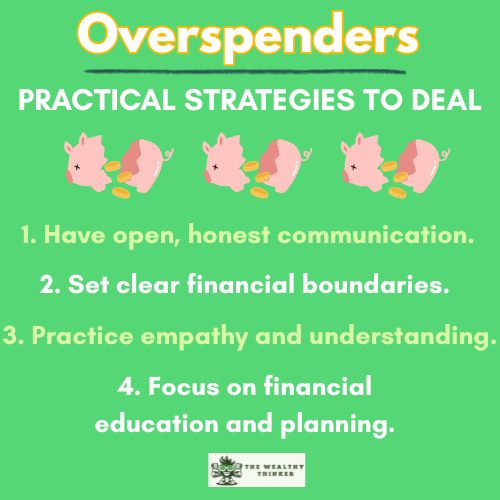It can be exhausting living with someone who spends too much, especially when it causes stress and financial problems.
Sharing finances with someone who regularly spends too much has a direct effect on your health, whether it’s a partner, family member, or roommate. It takes understanding, patience, and constructive interaction.
In this article, we’ll explore how living with an overspender can affect your mental health and give you practical ways to deal with the situation and keep your household’s finances in order.

How do you know you are overspending?
You’re overspending if:
- your expenses consistently exceed your income
- you find it challenging to pay off your credit card debt
- you don’t have sufficient savings to cover unexpected expenses, such as medical bills or car repairs
- you’re unable to make progress toward your long-term financial goals, such as saving for retirement or buying a home
- you frequently make impulse purchases or buy items without considering their long-term value or necessity
- your debt obligations, including loans and credit card payments, consume a significant portion of your income
8 Reasons Why People Overspend
Overspending is caused by various factors which could be psychological, social, and economic influences.
Here are some common causes of overspending:
1. Emotional spending
Many people shop to relieve tension, boredom, sadness, and other feelings.
Retail therapy temporarily relieves bad emotions, causing impulse purchases and overspending.
2. Peer pressure
Overspending can result from peer pressure and the desire to fit in.
Social comparison and the desire to spend more might result from seeing others with expensive items or activities
3. Impulse buying
Impulse buying is when people buy without thinking.
Attractive displays, limited-time deals, and peer pressure can cause impulse purchases and overspending.
4. Advertising and marketing tactics
Advertising and marketing tactics build demands and convince consumers they need particular products or services.
This can impact spending and cause impulsive purchases.
5. Financial illiteracy
Many people overspend because they lack financial literacy.
Without budgeting, saving, and debt management knowledge, people may make bad financial decisions and struggle to limit spending.
6. Easy access to credit
Overspending can result from easy access to credit cards, loans, and other consumer credit.
Easy financing may tempt people to buy things they can’t afford, causing debt and financial distress.
7. Lifestyle inflation
As incomes rise, people upgrade their lifestyles and spend more on discretionary products.
This might lead to rising expenses and the requirement for a bigger income to finance the lifestyle.
8. Lack of financial goals
Without defined goals and priorities, people may struggle to control spending and make smart financial decisions.
Setting goals like saving for retirement or a child’s education will help you avoid excessive spending.
Understanding the Emotional Toll of Living with an Overspender
The emotional consequences of dealing with someone who overspends can be overwhelming.
It’s essential to recognize and address these emotions to protect your mental health and maintain a healthy relationship with your overspending loved one.
Here are some ways in which living with an overspender can impact your emotional health:
1. Stress
Spending too much can cause stress and worry about money.
It can be bad for your mental health to worry all the time about bills, debt, and being able to pay for everyday things. Being worried that you won’t have enough money to pay your bills can make you anxious all the time, which can affect your mood, sleep, and eating habits.
2. Lower self-esteem
It’s bad for your self-esteem and self-worth to spend more than you need to.
If you can’t keep your spending in check and handle your money well, you might feel like you lack self-control and discipline, which can hurt your confidence and self-worth.
3. Tense relationships
Problems with money, like spending too much, can make relationships tough, whether they’re with a partner, family, or friends.
These stresses can hurt your mental health and make it harder to make friends, because it can lead to feelings of resentment and frustration.
4. Reduced financial freedom
A person’s general sense of freedom is closely linked to how much money they have.
When you spend too much, you might not have enough money to reach your personal goals, do fun things, or change careers.
This loss of financial freedom can make you angry and unhappy, and it can also stop you from reaching your long-term financial goals and dreams. Spending too much can make your savings goals seem impossible to reach, whether they’re for a house, a dream trip, or retiring early.
7 Practical Strategies to Manage Emotional Stress & Foster Financial Harmony
Living with an overspender can seem like you’re walking on eggshells at times. But there are some key strategies to keep in mind if you want to work through this together.
1. Open and honest communication
When there are money problems in a relationship, good communication is key.
Sit down with the person you care about who spends too much, and be open and honest about how you feel about their spending habits.
Instead of criticizing or blaming them, try to talk about how you feel and come up with answers together.
2. Set clear financial boundaries
Making clear rules about money can help avoid waste and build a sense of responsibility.
You could make a budget together, laying out limits on what you can spend on extras, and agree on your financial goals and responsibilities.
Setting clear limits can help manage money better and make sure that both of you understand what’s expected of you.
3. Practice empathy and understanding
Realizing that overspending could be a sign of deeper emotional or mental issues makes it important to treat the person with kindness and understanding.
Take the time to hear what the other person has to say and try to figure out why they spend the way they do. Give them help and encouragement as they try to stop spending too much.
4. Focus on financial education and planning
Spend some time together learning how to make a budget, save money, and invest.
Also, look into how to set fiscal standards and goals that you can reach. It’s easier to handle the ups and downs of money management when you work together as a team.
5. Practice self-care and stress management
Make time for things that make you happy and calm down, like working out, meditating, or spending time with family and friends who are there for you.
As you deal with the difficulties of living with someone who spends too much, show yourself care and kindness.
6. Focus on what you can control
You may not be able to stop your loved one from spending too much, but you can change how you react and what you do.
Pay attention to the things you can do to handle your money, create good limits, and grow a sense of financial freedom and security. You can lower your stress and worry and give your partner a greater sense of power in your relationship by taking steps to protect your financial well-being.
7. Seek professional help if needed
Consult a financial counsellor or therapist right away if excessive spending is really impacting your relationship or family.
In order to control overspending and enhance communication in your relationship, a trained professional can offer direction, encouragement, and useful strategies. In order to resolve financial problems, keep in mind that asking for assistance is a sign of strength rather than weakness.
Overspending: Are You Guilty? Where Does it Stem From & How Can You Stop?→
Living With an Overspender: Final Thoughts
Living with an overspender can be difficult, but tolerance, empathy, and good communication can help.
Realizing the emotional toll of excessive spending on relationships and using stress and money management strategies can protect your mental health and strengthen your relationship with your overspending loved one.
Always remember that you can ask for help when needed when cohabitating with an overspender. Prioritize self-care. Creating a more peaceful financial future comes with perseverance, empathy, and resilience.
Editor’s note: This article was originally published Feb 16, 2024 and has been updated to improve reader experience.



















